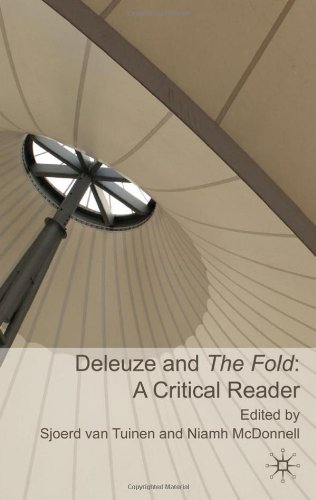Deleuze and the Fold: A Critical Reader pdf
Par newman raymond le jeudi, janvier 5 2017, 23:22 - Lien permanent
Deleuze and the Fold: A Critical Reader by Sjoerd van Tuinen, Niamh McDonnell


Deleuze and the Fold: A Critical Reader Sjoerd van Tuinen, Niamh McDonnell ebook
Publisher:
Format: pdf
Page: 256
ISBN: 0230552870, 9780230552876
For the most part I seem to be looking at Gilles Deleuze specifically. I'd been attempting to I find in addition to those factors you mention, the other books I'm reading at the same time also influence the way I read- whether I approach it in a more scientific or poetic way for example might depend on whether I'm reading an anthropology text or some Sufi verse. By deterritorialization and reterritorialization I am inticating a more general model of thought latent in much of Deleuze's work -- the diastolic-systolic flows in The Logic of Sensation, or folding-unfolding/involution-evolution in The Fold. Within Deleuze's baroque 'house', physical matter drags the soul down into the world of the flesh. The characterisation of baroque architecture as 'Jesuit' leads back to the arch-classicist and style historian Quatremère de Quincy, who, as a disciple of Wincklemann, was highly critical of any art and architecture since the Renaissance. Many a time, the readers of Deleuze have had the opportunity to notice that his critique of the Law and his desire to be done with judgment (pour en finir avec le jugement) are often followed by an appeal to the art of jurisprudence. The two-leveled world can also be associated with the realms of the flesh and the soul. Deleuze and the Fold: A Critical Reader. You may have noticed that I wrote a post on Deleuze's reading of Hume, from Deleuze's book Pure Immanence. Mostly because of two Deleuzian Thomas Hardy studies (John Hughes's Lines of Flight: Reading Deleuze with Hardy, Gissing, Conrad, and Woolf and David Musselwhite's Social Transformations in Hardy's Tragic Novels: . The key to unlocking Deleuze's diverse engagements in topics spanning cinema, politics, art, music, as well as his core concepts: the nomad, the fold, and rhizomes is the univocity of being. A consistent, post-Darwinian critical theory needs to begin with the thought that if positivism gives us bad social science, it also gives us bad natural science — and in both cases, for the same reason: because positivism is implicitly committed to the dogmatic After reading Deleuze's The Fold and piking up the contagion of Steve Shaviro's enthusiasm for Whitehead evident in his blog posts I decided a while ago that I was going to have to read Whitehead's work. A recent example of how my "expectations" about a book actually hindered my reception of what the author was saying was my attempt to read Deleuze's The Fold.